| Listing 1 - 10 of 19 | << page >> |
Sort by
|
Book
ISBN: 0472070606 Year: 2009 Publisher: Ann Arbor : University of Michigan Press,
Abstract | Keywords | Export | Availability | Bookmark
 Loading...
Loading...Choose an application
- Reference Manager
- EndNote
- RefWorks (Direct export to RefWorks)
African Americans --- Hip-hop --- Legal status, laws, etc. --- Influence. --- Jim Crow laws --- African Americans Legal status, laws, etc.
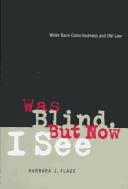
ISBN: 0814728871 0585030936 0814726437 Year: 1997 Publisher: New York, NY : New York University Press,
Abstract | Keywords | Export | Availability | Bookmark
 Loading...
Loading...Choose an application
- Reference Manager
- EndNote
- RefWorks (Direct export to RefWorks)
"Race" does not speak to most white people. Rather, whites tend to associate race with people of color and to equate whiteness with racelessness. As Barbara J. Flagg demonstrates in this important book, this "transparency" phenomenon--the invisibility of whiteness to white people-- profoundly affects the ways in whites make decisions: they rely on criteria perceived by the decisionmaker as race-neutral but which in fact reflect white, race-specific norms. Flagg here identifies this transparently white decisionmaking as a form of institutional racism that contributes significantly, though unobtrusively, to the maintenance of white supremacy. Bringing the discussion to bear on the arena of law, Flagg analyzes key areas of race discrimination law and makes the case for reforms that would bring legal doctrine into greater harmony with the recognition of institutional racism in general and the transparency phenomenon in particular. She concludes with an exploration of the meaning of whiteness in a pluralist culture, paving the way for a positive, nonracist conception of whiteness as a distinct racial identity. An informed and substantive call for doctrinal reform, Was Blind But Now I See is the most expansive treatment yet of the relationship between whiteness and law.
Race discrimination --- African Americans --- Jim Crow laws --- Law and legislation --- Legal status, laws, etc. --- United States --- Race relations. --- Race question --- African Americans Legal status, laws, etc.
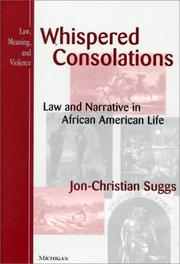
ISBN: 1282444514 9786612444517 0472022822 9780472022823 0472106511 9781282444515 6612444517 9780472106516 Year: 2000 Publisher: Ann Arbor
Abstract | Keywords | Export | Availability | Bookmark
 Loading...
Loading...Choose an application
- Reference Manager
- EndNote
- RefWorks (Direct export to RefWorks)
Explores the relationship between African American literature and American law
African Americans --- Race discrimination --- Justice. --- Injustice --- Conduct of life --- Law --- Common good --- Fairness --- Jim Crow laws --- Legal status, laws, etc. --- Law and legislation --- African Americans Legal status, laws, etc.
Book
ISBN: 144385929X 9781443859295 1443854018 9781443854016 Year: 2014 Publisher: Newcastle upon Tyne, UK
Abstract | Keywords | Export | Availability | Bookmark
 Loading...
Loading...Choose an application
- Reference Manager
- EndNote
- RefWorks (Direct export to RefWorks)
Undoing Plessy: Charles Hamilton Houston, Race, Labor and the Law, 1895-1950 explores the manner in which African Americans countered racialized impediments, attacking their legal underpinnings during the first half of the twentieth century. Specifically, Undoing Plessy explores the professional life of Charles Hamilton Houston, and the way it informs our understanding of change in the pre-Brown era. Houston dedicated his life to the emancipation of oppressed people, and was inspired early-on...
African American civil rights workers --- African Americans --- Jim Crow laws --- Jim Crowism --- Segregation --- Segregation. --- Legal status, laws, etc. --- Civil rights --- History. --- Social conditions --- Houston, Charles Hamilton, --- Houston, Charles, --- Houston, Charles H. --- African Americans Legal status, laws, etc.
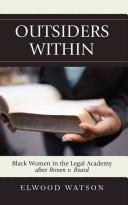
ISBN: 1282497715 9786612497711 0742599809 9780742599802 9780742540736 0742540731 9781282497719 6612497718 Year: 2008 Publisher: Lanham, MD Rowman & Littlefield
Abstract | Keywords | Export | Availability | Bookmark
 Loading...
Loading...Choose an application
- Reference Manager
- EndNote
- RefWorks (Direct export to RefWorks)
Through interviews with prominent legal academics, Outsiders Within presents the trials and accomplishments of black women law professors who began to enter the legal academy in the 1970s and 80s.
Book
ISBN: 110860787X 110866539X 1316577163 1107150345 1316604721 Year: 2018 Publisher: Cambridge, England : Cambridge University Press,
Abstract | Keywords | Export | Availability | Bookmark
 Loading...
Loading...Choose an application
- Reference Manager
- EndNote
- RefWorks (Direct export to RefWorks)
Before the Civil War, colonization schemes and black laws threatened to deport former slaves born in the United States. Birthright Citizens recovers the story of how African American activists remade national belonging through battles in legislatures, conventions, and courthouses. They faced formidable opposition, most notoriously from the US Supreme Court decision in Dred Scott. Still, Martha S. Jones explains, no single case defined their status. Former slaves studied law, secured allies, and conducted themselves like citizens, establishing their status through local, everyday claims. All along they argued that birth guaranteed their rights. With fresh archival sources and an ambitious reframing of constitutional law-making before the Civil War, Jones shows how the Fourteenth Amendment constitutionalized the birthright principle, and black Americans' aspirations were realized. Birthright Citizens tells how African American activists radically transformed the terms of citizenship for all Americans.
African Americans --- Citizenship --- Race discrimination --- Birthright citizenship --- Citizenship (International law) --- National citizenship --- Nationality (Citizenship) --- Political science --- Public law --- Allegiance --- Civics --- Domicile --- Political rights --- Jim Crow laws --- Legal status, laws, etc. --- Civil rights --- History --- Law and legislation --- History. --- African Americans Legal status, laws, etc.
Book
ISBN: 1620973413 9781620973417 9781620973400 1620973405 Year: 2019 Publisher: New York
Abstract | Keywords | Export | Availability | Bookmark
 Loading...
Loading...Choose an application
- Reference Manager
- EndNote
- RefWorks (Direct export to RefWorks)
"A groundbreaking exposé about the alarming use of rap lyrics as criminal evidence to convict and incarcerate young men of color"--
African Americans --- Rap musicians --- Discrimination in criminal justice administration --- Rap (Music) --- Freedom of expression --- Hip-hop music --- Rap songs --- Rappin' (Music) --- Rapping (Music) --- Monologues with music --- Popular music --- Trip hop (Music) --- MCs (Rap musicians) --- Rappers --- Musicians --- Jim Crow laws --- Legal status, laws, etc. --- Social aspects --- African Americans Legal status, laws, etc.
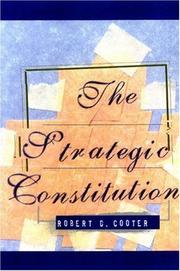
ISBN: 0691096201 0691058644 0691214506 Year: 2002 Publisher: Princeton, N.J. Princeton University Press
Abstract | Keywords | Export | Availability | Bookmark
 Loading...
Loading...Choose an application
- Reference Manager
- EndNote
- RefWorks (Direct export to RefWorks)
Making, amending, and interpreting constitutions is a political game that can yield widespread suffering or secure a nation's liberty and prosperity. Given these high stakes, Robert Cooter argues that constitutional theory should trouble itself less with literary analysis and arguments over founders' intentions and focus much more on the real-world consequences of various constitutional provisions and choices. Pooling the best available theories from economics and political science, particularly those developed from game theory, Cooter's economic analysis of constitutions fundamentally recasts a field of growing interest and dramatic international importance. By uncovering the constitutional incentives that influence citizens, politicians, administrators, and judges, Cooter exposes fault lines in alternative forms of democracy: unitary versus federal states, deep administration versus many elections, parliamentary versus presidential systems, unicameral versus bicameral legislatures, common versus civil law, and liberty versus equality rights. Cooter applies an efficiency test to these alternatives, asking how far they satisfy the preferences of citizens for laws and public goods. To answer Cooter contrasts two types of democracy, which he defines as competitive government. The center of the political spectrum defeats the extremes in "median democracy," whereas representatives of all the citizens bargain over laws and public goods in "bargain democracy." Bargaining can realize all the gains from political trades, or bargaining can collapse into an unstable contest of redistribution. States plagued by instability and contests over redistribution should move towards median democracy by increasing transaction costs and reducing the power of the extremes. Specifically, promoting median versus bargain democracy involves promoting winner-take-all elections versus proportional representation, two parties versus multiple parties, referenda versus representative democracy, and special governments versus comprehensive governments. This innovative theory will have ramifications felt across national and disciplinary borders, and will be debated by a large audience, including the growing pool of economists interested in how law and politics shape economic policy, political scientists using game theory or specializing in constitutional law, and academic lawyers. The approach will also garner attention from students of political science, law, and economics, as well as policy makers working in and with new democracies where constitutions are being written and refined.
Public law. Constitutional law --- Political philosophy. Social philosophy --- Constitutional law --- Game theory. --- Law and economics. --- Philosophy. --- Dret constitucional --- Filosofia. --- Jim Crow laws. --- Pareto frontier. --- accountability: of legislators. --- agenda setting rules. --- bargaining, legislative. --- chaos theorem. --- commodity, contingent. --- condemnation doctrine. --- consequentialism. --- delegation game. --- discussion set. --- emergency doctrine. --- engorgement principle. --- hate speech. --- intransivity. --- judicial review. --- law merchant. --- matching grants. --- maximin. --- natural monopoly. --- patronage system. --- political speech. --- private bads. --- slavery. --- sub-majority rule. --- term limits. --- unicameralism. --- white flight. --- zero-sum game.
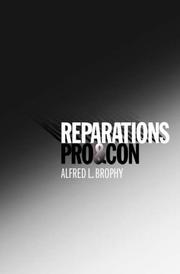
ISBN: 1280846372 0198041349 1429440139 9780198041344 9780195304084 019530408X 9781429440134 9786610846375 6610846375 0195304071 9780195304077 0190293896 0197720390 Year: 2006 Publisher: Oxford [England] ; New York : Oxford University Press,
Abstract | Keywords | Export | Availability | Bookmark
 Loading...
Loading...Choose an application
- Reference Manager
- EndNote
- RefWorks (Direct export to RefWorks)
The debate over reparations, whether African-Americans should be compensated for decades of racial subjugation, stands as a racially divisive issue in American politics. This work regards the debate over reparations since the 1700s. It examines the arguments and offers a historical and legal perspective for advocates and critics alike.
African Americans --- Compensation (Law) --- Reparations for historical injustices. --- Restorative justice. --- Balanced and restorative justice --- BARJ (Restorative justice) --- Community justice --- Restorative community justice --- Criminal justice, Administration of --- Reparation (Criminal justice) --- Redress for historical injustices --- Reparation for historical injustices --- Reparations --- Reparations for past injustices --- Restitution for historical injustices --- Indemnity --- Social justice --- Jim Crow laws --- Reparations to African Americans --- Reparations for historical injustices --- Reparations. --- Legal status, laws, etc. --- Claims --- African Americans Legal status, laws, etc.
Book
ISBN: 1139990225 1139985604 1139583743 1107037107 1107697972 Year: 2014 Publisher: Cambridge : Cambridge University Press,
Abstract | Keywords | Export | Availability | Bookmark
 Loading...
Loading...Choose an application
- Reference Manager
- EndNote
- RefWorks (Direct export to RefWorks)
Did the civil rights movement impact the development of the American state? Despite extensive accounts of civil rights mobilization and narratives of state building, there has been surprisingly little research that explicitly examines the importance and consequence that civil rights activism has had for the process of state building in American political and constitutional development. Through a sweeping archival analysis of the NAACP's battle against lynching and mob violence from 1909 to 1923, this book examines how the NAACP raised public awareness, won over American presidents, and secured the support of Congress. In the NAACP's most far-reaching victory, the Supreme Court ruled that the constitutional rights of black defendants were violated by a white mob in the landmark criminal procedure decision Moore v. Dempsey. This book demonstrates the importance of citizen agency in the making of new constitutional law in a period unexplored by previous scholarship.
Civil rights --- African Americans --- Civil rights movements --- Jim Crow laws --- History --- Legal status, laws, etc. --- National Association for the Advancement of Colored People. --- NAACP (Organization) --- N.A.A.C.P. (Organization) --- Lynching --- Constitutional law --- Law and legislation --- United States. --- Homicide --- Supreme Court (U.S.) --- Chief Justice of the United States --- Supreme Court of the United States --- 美國. --- Anti-lynching movements --- African Americans Legal status, laws, etc.
| Listing 1 - 10 of 19 | << page >> |
Sort by
|

 Search
Search Feedback
Feedback About UniCat
About UniCat  Help
Help News
News